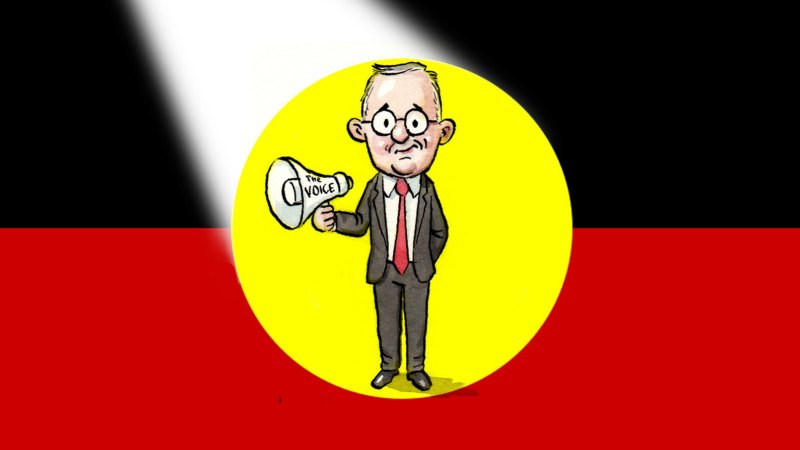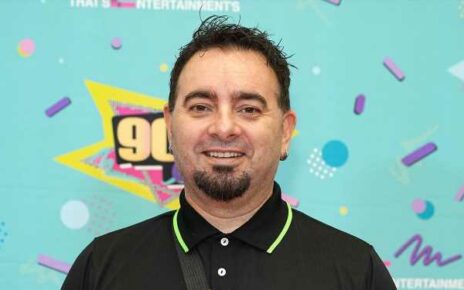Save articles for later
Add articles to your saved list and come back to them any time.
Two months ago, announcing the provisions Australians would vote on at a referendum, Anthony Albanese made a statement that is more interesting now than it was then. Referring to the Indigenous leaders standing with him, he said if he had their lives he did not know “that I could be as generous and as modest in my request. I would like to think that I would be, but you can’t stand in other people’s shoes.”
Which Albanese is correct?Credit: Alex Ellinghausen
This is interesting because, last week in parliament, speaking on the bill to alter the Constitution, the prime minister asked Australians to do the very thing he had earlier said was impossible. For “just a moment”, he said, “put yourself in the shoes of the people calling for this change … Imagine that you stand on the other side of the gap. Imagine your brothers and sisters are likely to die a decade younger than the general population … Imagine that people in your community are twice as likely to commit suicide as anywhere else.”
Which Albanese was correct? The one who said we can’t stand in other people’s shoes, or the one that expressed hope that we could?
The answer to that question may determine how Australians vote later this year. Or, more specifically, how non-Indigenous Australians vote. Tina Turner died last week – a musical god. Another legacy she leaves is her bravery in speaking about the fact her husband beat her up. After she died, I came across an old interview with comedian Chris Rock. “If you saw Tina Turner and Ike having a lovely breakfast over there, would you say their relationship’s improved? Some people would,” he said. “But a smart person would go, ‘Oh, he stopped punching her in the face’.”
Rock was making a broader point about who we tend to hold responsible for change and its opposite. He pointed out the tendency to describe Barack Obama’s election as a sign of “black progress”, with its implication that black Americans had finally taken a huge step forward. No, he said: it was “white progress”. “There’s been black people qualified to be president for hundreds of years … The advantage that my children have is that my children are encountering the nicest white people that America has ever produced.”
So, what about non-Indigenous Australians? Are they nicer than they’ve ever been? Just after the budget, one set of pollsters asked focus groups what they remembered. Some observed there was nothing in it for them, less with anger than resignation. Two other things stood out. They were furious about the scandal involving PwC, the consultants alleged to have used confidential Treasury information to help clients dodge tax. And, while acknowledging the government was trying to help, they were also annoyed more hadn’t gone to those on JobSeeker.
Illustration: Jim Pavlidis.Credit:
These reactions matched a research note the polling company Redbridge had put out two weeks before the budget. The note focused on the issue of “resource competition”: with limited government money, voters ask who is it being spent on and who is missing out. Historically, voters “kicked down” at groups like migrants, refugees and the unemployed. Lately, though, empathy had become more prominent. “Middle Australia wants to see government extend a helping hand, not the boot, to those less fortunate than them.”
Not everyone in the political class agrees with this assessment. And it is possible, too, that what Redbridge is seeing is a passing moment – one that may pass quickly if the economy drastically worsens. There are, however, some signs it may presage a more permanent shift, particularly among younger generations, where it is possible wealth inequality is affecting broader attitudes.
On Friday, Indigenous leaders gathered in Central Australia to mark six years since the Uluru Statement from the Heart was delivered, and to “anchor” themselves before the campaign’s final months. What those months will be dominated by nobody knows. One aspect is likely to be increased racism: one leader, Pat Anderson, reportedly said hate had recently been “raining down”. Will the empathetic side of Australians push back against it, overpower it and – in the final vote– defeat it?
There has been much focus, lately, on polling, the apparent slide in the Yes vote among Australians, and whether the Yes campaign is making mistakes, either in standing firm in its requests or tactically. These are reasonable and important questions. But it has begun to feel as though we are approaching the point at which this slides into the type of mistake we often see in coverage of elections: a focus on campaign mechanics, political strategy and the horse race instead of remembering what is actually at stake.
In a normal election campaign, this mistake is bad but could benefit either side. Here, it benefits only the No side, doing the work of that campaign for it: by driving people away from difficult human questions and allowing them to take shelter in abstractions.
Because the Voice referendum is, ultimately, asking a very difficult human thing of us, one defined by the gap between Albanese’s two statements. We can never stand in someone else’s shoes – not really. But it is also true that we should keep on trying. Together, the statements point to the enormous difficulty of the task. It is far harder than mere sympathy; it requires more of us than vaguely grasping the fact Indigenous Australians have been hard done by and deserve a bit of recognition. It requires a sincere attempt to understand what it might feel like to grow up knowing you have about 10 fewer years to live than everyone else in the country. I find myself able to attempt this, but certain I have not managed it.
The great difficulty of genuine empathy is not only central to the unfolding of the campaign, it is at the centre of the Uluru Statement itself. When we can’t put ourselves in someone else’s shoes, no matter how hard we try, what do we do then? We do the human thing and ask them what it’s like, what they think might be done, and then we listen to their voice as they answer.
Sean Kelly is author of The Game: A Portrait of Scott Morrison, a regular columnist and a former adviser to Julia Gillard and Kevin Rudd.
The Opinion newsletter is a weekly wrap of views that will challenge, champion and inform your own. Sign up here.
Most Viewed in Politics
From our partners
Source: Read Full Article



